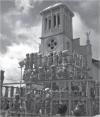Abstract
The patronal feast with their ceremonial spaces are a cultural heritage, a legitimate display of inheritance in a territoryand presented in villages (corregimientos) located around the city of San Juan de Pasto in the Valley of Atriz (Nariño,Colombia). Through the analysis of documents, fieldwork and community inclusion, a participatory methodology wasbuilt which allowed the recognition of festivities with strong religious and Andean values in the villages adjacent to theGaleras volcano, by syncretism among Andean pre-Hispanic memories and Spanish inheritances of religious manifestations.It is taken as a case of study and reflection, the Patronal feast of St. Peter and St. Paul in the Corregimientoof Jongovito, based on Andean agricultural religious and popular celebrations, temporarily transforming the territoryinto a ceremonial space, where the patrons Saints and the Guaguas de Pan are main characters in an attitude offervor and community thankfulness, linking customs, knowledge and traditions which provide a special stamp to theirculture. These inheritances open new spaces and lines of research into the Andean festivity culture and religioustraditions present in the South of the country.Apuntes is registered under a Creative Commons Attribution 4.0 International Public License. Thus, this work may be reproduced, distributed, and publicly shared in digital format, as long as the names of the authors and Pontificia Universidad Javeriana are acknowledged. Others are allowed to quote, adapt, transform, auto-archive, republish, and create based on this material, for any purpose (even commercial ones), provided the authorship is duly acknowledged, a link to the original work is provided, and it is specified if changes have been made. Pontificia Universidad Javeriana does not hold the rights of published works and the authors are solely responsible for the contents of their works; they keep the moral, intellectual, privacy, and publicity rights.
Approving the intervention of the work (review, copy-editing, translation, layout) and the following outreach, are granted through an use license and not through an assignment of rights. This means the journal and Pontificia Universidad Javeriana cannot be held responsible for any ethical malpractice by the authors. As a consequence of the protection granted by the use license, the journal is not required to publish recantations or modify information already published, unless the errata stems from the editorial management process. Publishing contents in this journal does not generate royalties for contributors.


